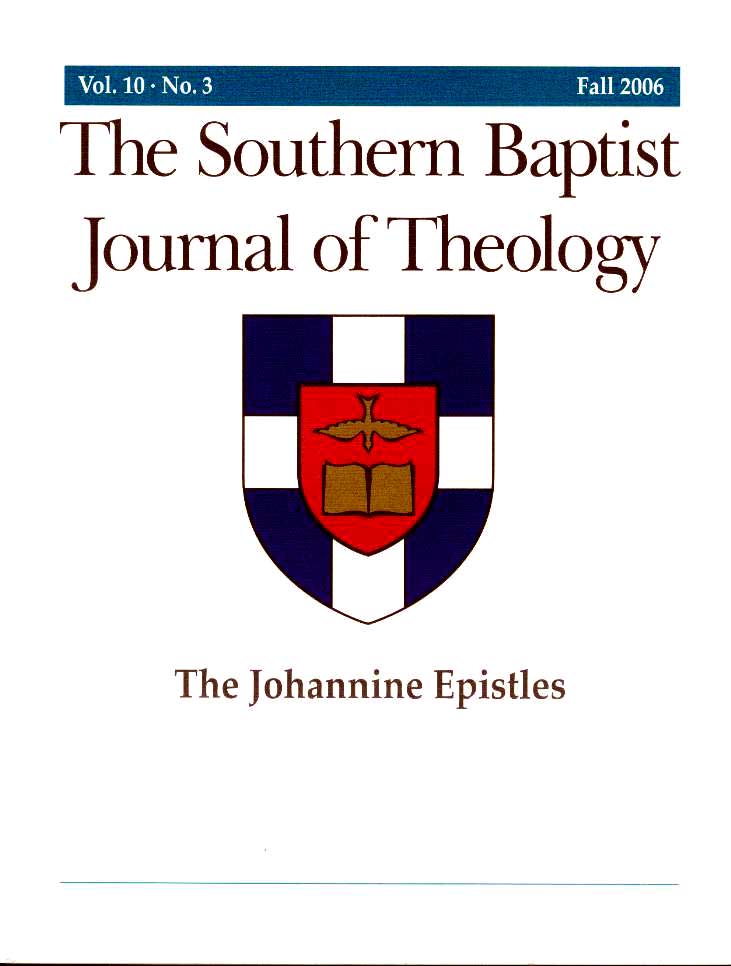
LOUISVILLE, Ky. (BP)–Insights from the New Testament epistles of John can help believers reject the myriad of false doctrines in today’s world and resist temptations to immoral living, according to the authors of the latest edition of The Southern Baptist Journal of Theology.
“Around us on every side are calls to ‘revision’ Christian theology, to ‘re-imagine’ evangelism, to ‘re-think’ how we do church, and even to ‘re-articulate’ the very nature of the gospel for our postmodern times,” writes journal editor Stephen J. Wellum. “… John reminds us that we must continually go back to what was ‘from the beginning’ and to the testimony of the first eyewitnesses who bore witness to the Word — who alone is the way, the truth, and the life.”
John’s letters present three tests of all genuine believers that can be labeled the “truth test,” the “moral test” and the “love test,” writes Wellum, who serves as professor of Christian theology The Southern Baptist Theological Seminary. The tests remind readers that correct doctrine leads to godly living, he says.
“In a day in which the link between belief and behavior is compromised, where talk of ‘love’ is nebulous and undefined, where ‘spirituality’ is divorced from truth and morality, and an individualistic Christianity still continues to dominate in so many respects, we need to hear from God’s Word that truth, obedience, and love are not an option for the Christian church.”
In his essay “Getting Up to Speed: An Essential Introduction to 1 John,” Barry Clyde Joslin discusses the author, date, original recipients and main emphases in 1 John. Joslin, who serves as assistant professor of Christian theology at Boyce College, also presents a general outline of the book.
“The aim of this article is practical: to provide a framework for further study, preaching, and teaching of the Bible, specifically 1 John,” Joslin writes. “What follows is a tool that will hopefully prove useful to the pastor, Sunday School teacher, youth director, Bible study leader, and anyone else wanting an overview of John’s first epistle.”
Both internal and external evidence point to the fact that the Apostle John wrote 1 John, Joslin asserts. He also argues that the book was written around A.D. 90 from the region of Ephesus to an audience that was made up of both Jewish and Gentile Christians.
John’s purpose in writing was to counter false teachers who spread wrong ideas about Christ and the nature of Christianity, Joslin writes. The dual themes of belief and obedience dominate the letter, and the two themes “are broken into three familiar tests to which John continually returns: the test of doctrine, the test of obedience, and the test of love,” Joslin argues.
“Theology leads to doxology, and thus the study of what God has revealed in 1 John ought to lead his people to worship the one of whom this revelation speaks,” he writes.
John Polhill, in his essay “The Setting of 2 John and 3 John,” asserts that the final two epistles of John are often neglected by Christians but discuss issues that are highly relevant for the church today.
Second John is closely related to 1 John and combats false teachers who did not accept the humanity of Jesus and claimed to be above sin, writes Polhill, who serves as senior professor of New Testament interpretation at Southern Seminary.
The main message of 2 John “consists of three parts: the command to love (4-6), the error of the false teachers (7-9), and shunning the false teachers (10-11),” he writes.
Third John addresses a problem of church leadership and speaks specifically to a situation where an individual in one church “was rejecting John’s apostolic leadership by refusing to accept the missionary workers sent out by the apostle,” Polhill writes.
The letter commends a person named Gaius for his hospitality toward missionaries, rebukes the opposition of a man named Diotrephes and commends someone by the name of Demetrius, Polhill says.
“Third John warns us about the perils of the ego,” Polhill writes. “Diotrephes’s lust for power caused him to hinder the Christian missionaries and, thus, undermine the central evangelistic task that is at the heart of the gospel. It did so then, and it can do the same now.”
Polhill concludes, “The two smallest books in the New Testament present us with two of the biggest problems, problems that continue to confront the church.”
The SBJT also includes essays by New Testament scholars A.B. Caneday, Colin G. Kruse and Randall K.J. Tan. The journal also features a number of book reviews.
–30–
Subscription information about The Southern Baptist Journal of Theology can be obtained by e-mailing [email protected] or by calling 502-897-4413. Selected articles from the journal can be read online at https://www.sbts.edu/Resources/Publications/Journal/Fall_2006.aspx
















